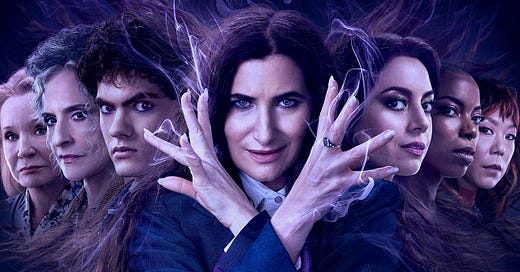Is Agatha a Tragic Heroine?
What "Agatha All Along" has in common with "Promising Young Woman," 'Thelma and Louise," and "Game of Thrones," and what this can teach us about all women's journeys.
We asked Stacey Simmons, the author of one of our new favorite culture books, The Queen’s Path: A Revolutionary Guide to Women’s Empowerment and Sovereignty, to apply her book’s findings to one of the best recent female-centric shows, Agatha All Along. In The Queen’s Path, Simmons argues that women cannot experience a traditional Hero’s Journey under patriarchy, and then lays out the actual paradigm for women, based on her observations of pop culture and as a therapist working with many real women. It has helped me to understand my life story in new ways, to strive for queendom—and I can’t stop applying it to every female story I now consume. Here are her thoughts on Agatha. — Jennifer Keishin Armstrong
A few weeks before Halloween I realized that the majority of the media I consume is witch-themed. All year round I’m watching Practical Magic, Paranormal Caught on Camera, Harry Potter movies, The Chilling Adventures of Sabrina, and documentaries like The Witches of Hollywood. I am a therapist, so I should probably look at that at some point. I’m also a practicing witch, so I maybe it’s not that weird.
Naturally, before the first episode of Agatha All Along aired, I was fully invested in the witchy premise and aesthetic of the show. The first episode mimicked a procedural police drama, one of my favorite genres. By episode 2 it was obvious I didn’t know enough to understand what was happening, so I went back and watched it’s parent series, WandaVision from start to finish.
Before I continue, let me just interject a critical fact to the rest of the discussion. My brain has been hijacked for the last decade by the discovery of a woman’s analog to the Hero’s Journey that is not a Heroine’s Journey. The gist of the theory that I call The Queen’s Path is that there is a divide that comes for all women, placing them into one of two tracks.
On the first, the woman can become an idealized, passive feminine, a Maiden In Search Of Relationship (MISOR- pronounced MEE-sohr), like Snow White, or, in WandaVision, Wanda Maximoff. The second track is the opposite; she has power but no community or protection. She is Magical Isolated Powerful & Endangered (MIPE- pronounced MEE-pay): think Evil Queen, or in Agatha All Along, Agatha Harkness. The antidote for being divided is to become sovereign. To do that a woman has to traverse an archetypal journey similar to the Hero’s Journey, but specific to women’s lived experience.
Both tracks, MISOR and MIPE, are traps. Neither is better or worse than the other. Women spend their lives trying to navigate the divide between the two.
What I learned in my research is that while the hero is on a journey to get the boon or the elixir of life and share it with his people, the woman is on the path to sovereignty, of owning herself.
Women can’t take Hero’s journeys the same way a man can. A man is called to the quest, where a woman is almost always returning to herself in some way. A man will come back and share “the boon” with his community. No one wants that from a woman protagonist unless she’s already a queen. Yes, even in narrative, a well-qualified woman isn’t wanted for the Hero’s Journey if a similarly qualified man is in a 100-mile radius.
There’s a lot more to it than that, but the general idea is that there is a journey for women from innocence to sovereignty. The path is archetypal, which means that it operates at a subtle level in culture whether we recognize it or not.
The first steps separate a woman from her identity by the power and impact of culture.
The second set of steps have her trying to figure out, and often struggling to figure out how to make this work with as little pain as possible.
The third part of the journey is the hardest; it can end in her death, or in her losing her identity.
This can happen if she gives in to living only her role as a mother, wife, or monster. If she survives, she can move forward to becoming a fully realized queen. But first she has to find power in embodiment. Only after that step can she ascend to her queendom.
The biggest difference between Hero’s/Heroine’s journeys and The Queen’s Path is the possibility of this Third Quadrant ending. Lots of stories end here. Promising Young Woman ends here with Cassie descending into despair, and planning to exact revenge, only to be killed herself—no sovereignty for her. The 1991 masterpiece Thelma and Louise ends here, with the two protagonists preferring suicide over submission. Most fairy tales end in the third quadrant with a “Happily Ever After” moment. Both Daenerys Targaryen and Cersei Lannister get the same, third quadrant ending in the HBO adaptation of Game of Thrones. Consider it the tragic ending for women in story.
SPOILER ALERT: If you haven’t finished Agatha All Along on Disney Plus, don’t read further.
I was not prepared for the ending of Agatha All Along. I picked up every breadcrumb provided by the show’s very talented writing staff. I loved the possibility that Teen, (who we later learn is named William/Billy), could be the reincarnation of Agatha’s late son, Nicky. I bought into the lore of the Witches Road that could make a witch’s wishes come true. I hoped that the witches in Agatha’s impromptu pack might stay together and become coven sisters. I longed to understand why Agatha’s mom rejected her. I very much believed that Agatha herself was going to be redeemed. Yeah, clearly I want my own adventure down the witch’s road and a bevy of magical girlfriends to do it with.
But instead of all that promise, we get journeys towards sovereignty that end in tragic Third Quarter endings for Sharon, Alice, Lillia, and Agatha herself. Only Jen escapes—we don’t learn if she gets to sovereignty, but she gets her powers back, so it’s a distinct possibility. We learn that Billy is actually Wanda Maximoff’s son, in a stolen body he acquired when the hex/anomaly was unraveled over Westfield in WandaVision. Agatha is the MIPE to Wanda’s MISOR. And it makes sense that if Wanda is dead before reaching sovereignty, then Agatha’s fate might be the same. Agatha gets a tragic ending, but at least we understand why. For the last several hundred years she’s been stealing the magical life force of other witches. It started out as a means to save her son, but morphs into an addiction to power after his death. Agatha’s journey ends before she gets to embodiment and the ability to claim sovereignty for herself.
We will have to wait and see if William/Billy gets to sovereignty. Men can take the Queen’s Path, too; to know if a man is on the Queen’s Path, you’ll have to know if he is divided against himself and doesn’t “own” himself. Billy fits both of those. He’s literally been two people, William Kaplan and then Billy Maximoff. He is also struggling with which of those he should be. He’s trying to go all in on Billy, but still has parents and a boyfriend who love him as William.
Agatha might yet get to sovereignty if the show continues. Now that she’s a ghost without a body, I’m intrigued at how the writers might make this happen. Sovereignty requires embodiment, so we’ll see! Not sure if there will be another season, but we’re set up for one.
Ministry Book Corner 📚
Here at MOPC, not only are we pop culture writers, we’re also authors! Every Monday, we’re going to recommend each other’s work. And if you’d like to check out all of our books, visit our bookstore at Bookshop.org.
Kirthana recommends ... Jennifer's When Women Invented Television: The Untold Story of the Female Powerhouses Who Pioneered the Way We Watch Today
Radio is the mother of television. TV has no father. — Tallulah Bankhead
Every single TV show you have ever watched is indebted to the innovations of Irna Phillips, Gertude Berg, Hazel Scott and Betty White. And you would not know that, had Jen not written a book devoted to their work and legacies.
In the 1940s, with movies the dominant form of entertainment and television a still-nascent medium, each woman had the opportunity to carve out a space for themselves that ended up shaping modern-day conventions of television programming, from soaps and sitcoms to talk and variety shows. But as television became more popular (largely due to their work), men took control of the format, and with the exception of White, these women were pushed out and their stories largely forgotten.
This book constantly took me down YouTube rabbit holes, from watching episodes of Berg's pioneering sitcom The Goldbergs (it still holds up!) to Scott's awe-inspiring performances playing two grand pianos. And if you only know Betty White from The Golden Girls, this book will introduce you to her multifaceted career that spanned decades.
When Women Invented Television is a worthwhile tribute to these women's legacies, recounting their exceptional histories and giving them their due as pioneers whose influences can be felt to this very day.







